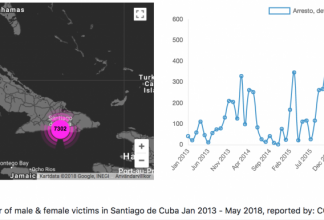Presenting the Defenders’ Database

Civil Rights Defenders is proud to present a beta-version of the Defenders’ Database. It all began when the organisations Hablemos Press and The Cuban Commission of Human Rights and National Recognition started filing monthly reports on human rights violations in Cuba back in 2010. They file as many as 400 to 700 incidents a month. This was however recorded and stored offline, therefore the idea to find a way to simplify and share the information online started to take form. This work culminated in Defenders Database, or DiDi, as it is also known.
The overarching goal of DiDi is to collect and display information on human rights violations globally. Human rights defenders, both individuals and organisations, can upload already existing files, fill in a new report, and view statistics. You can also download an offline version, that will synchronize with the database once it is connected to the internet.
About DiDi
The commitment
In one way or another we can all be defenders of human rights. Whether it is when we stand up for our friends and relatives when we believe that they have been mistreated or overlooked by the state, or when we take to the streets to make sure that our voices are heard. At Civil Rights Defenders we stand up for civil and political rights. We are committed to strengthening defenders globally and create the necessary tools to continue the work for a better day.
The tool
The Defenders’ Database (DiDi) is an easy-to-use tool designed to help human rights defenders to efficiently record, analyse and visualise data on human rights violations.
The features
- Recording: Human rights defenders can submit records of violations on DiDi both online and offline. There is an excel template that can be imported to the database. It is also possible to attach documents, photos and links to each report.
- Filtering: The DiDi users can filter their reports in the database and export the data for the purpose of visualisation and analysis.
- Parsing: Human rights organisations all over the world store and save records of human rights violations in different formats. Whether it is in PDF, Word, Excel or paperback, there is a lack of coherence in most suitable format. In order to achieve consistency, we have created a parsing module that can read old reports. Please contact us directly if you have a dataset you would like to import to DiDi.
- Visualising: If you become a certified user, you will be able to share the total number of violations added by your organisation through the map-and-graph-tool at the DiDi web page. The data can then be filtered according to the wishes of the visitor. The data is always anonymised.
The community
By using DiDi you can be sure that your reports live up to international standards for human rights collection of information. You also become part of our human rights defenders community where we share best practices in the work and provide solidarity and support to victims of violations. If you or your organisations are interested in using DiDi and become part of our community, read more here, and please contact us at database@crd.org and we will tell you more.


